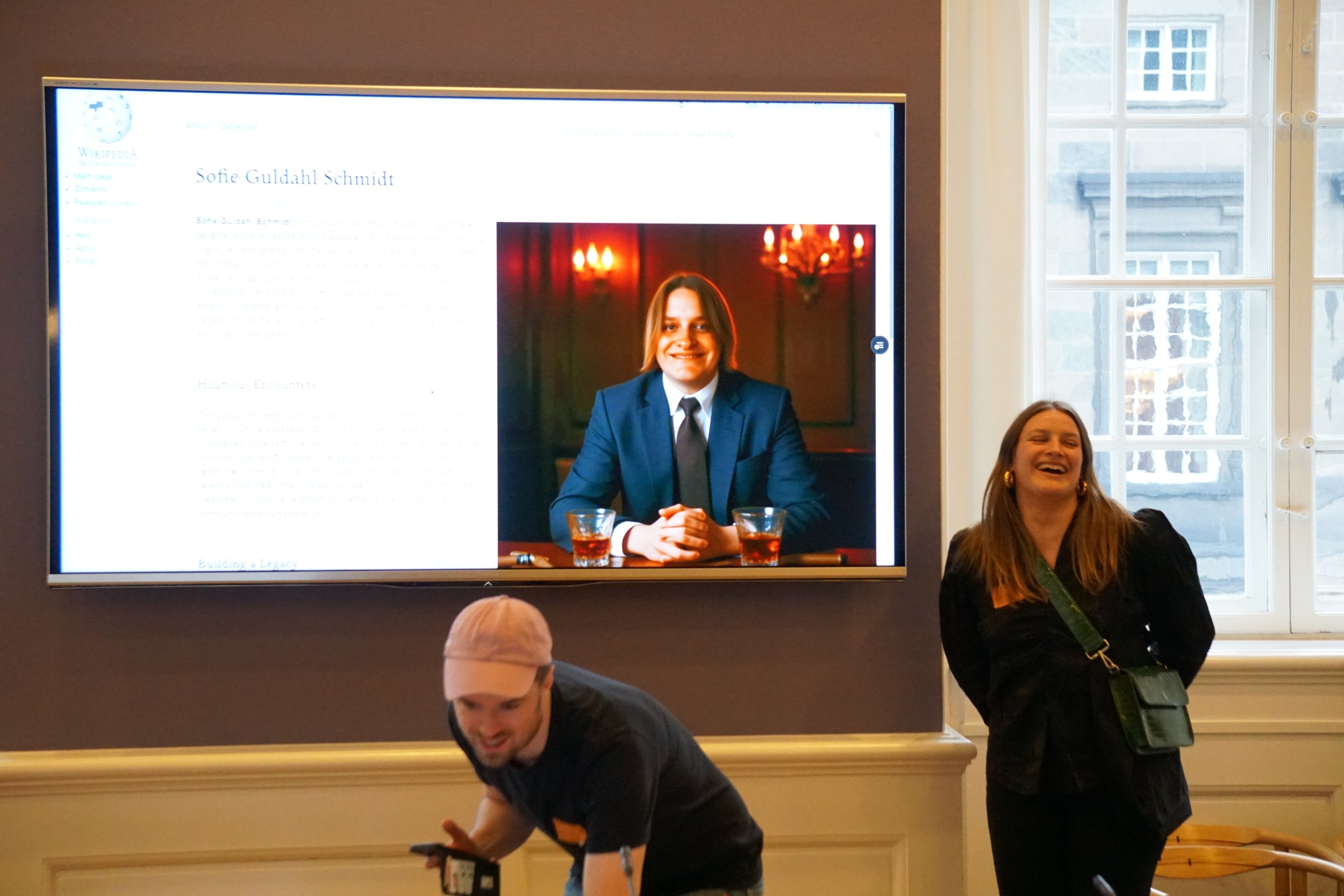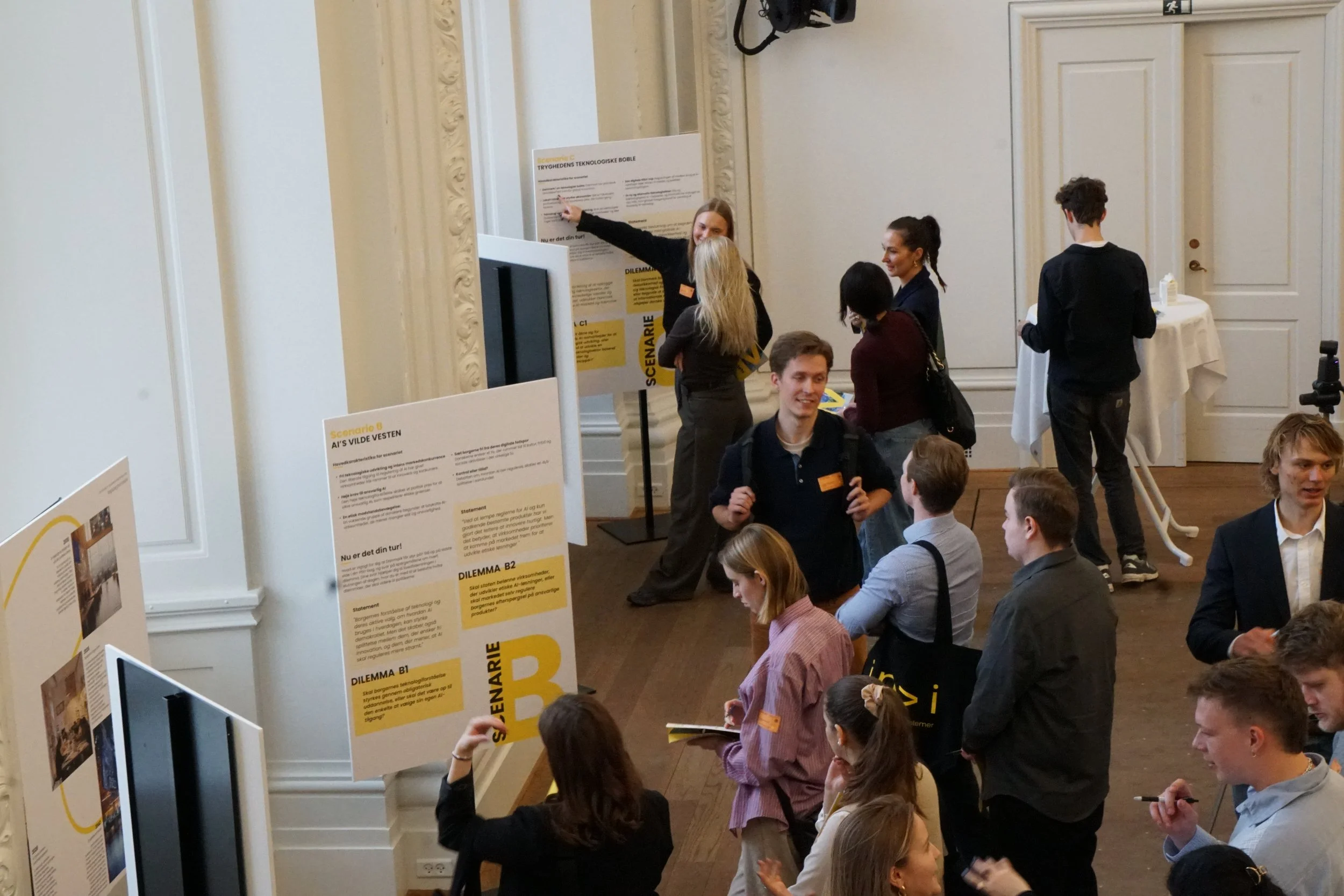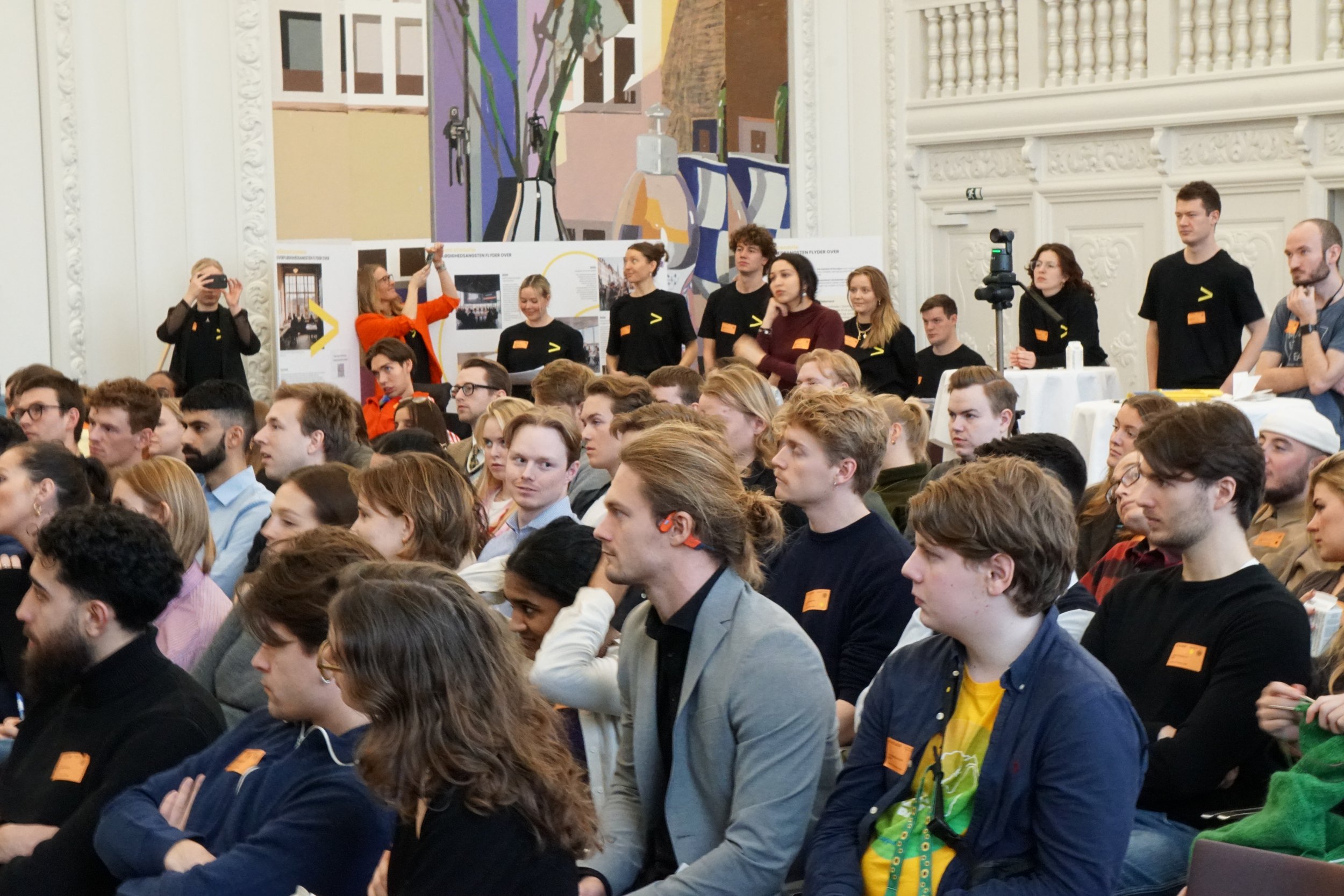Youth gather at major summit to create a common language on how to create responsible AI
150 young people between the ages of 18 and 30 – from all parts of the country, across education and jobs – gathered on Saturday, February 1st in the Landstingssalen at Christiansborg Palace. The hall was buzzing, and there was a lot of energy. They wrote letters to themselves in the future, interacted with AI art and experienced a panel debate. “We need a common language for how we create responsible AI ,” the debaters made clear. If we are to deal with AI – a naturally wild problem – we need to have greater knowledge about the technology so that we can imagine what the future might look like.
It's a big question how we create responsible artificial intelligence. The decisions we make today have a huge impact on our future society.
"As great as we can achieve, equally scary things can happen if we don't do it right," says Lisbeth Bech-Nielsen, chair of the Danish Parliament's Committee on Digitalisation and IT, to the 150 young people present in the Parliament Hall and continues:
"I safely leave it to you to figure out how we get to a future with responsible AI."
It is no coincidence that a diverse group of young people came together around the question of how we create responsible AI.
Young people are “digital natives” and are often the first to be exposed to new AI tools. At the same time, they can challenge the status quo because they do not necessarily take the inherited norms of the political system for granted.
This gives them a very special prerequisite for imagining what responsible AI might look like in the future.
"If we are to succeed in handling something as wild and complex as AI, it is crucial that we get you involved. We need your wishes as knowledge. That you take a position on the potential futures we face, so that today we have a conversation about where we want to go, while we can act," Tine Maria Borresø, Head of Communications at INVI and Summit Manager, began to the young gathering in the Landstingssalen when the event got underway.
And there is a need for us to approach wild problems in a new way. Only 14 percent of Danes believe that political decisions are made with an eye on whether they can be implemented. At the same time, 82% of Danes do not believe that society will be better in 10 years, according to an analysis conducted by INVI.
The Youth Summit shows a new path for how we can create confidence in the future by incorporating citizens' perspectives on how we tame wild problems.
The Youth Summit is part of the Folketinget's Wild Week, which consists of three events. For the first event, "The Political Laboratory", interested young people and AI experts developed future scenarios for what responsible artificial intelligence could look like in 2040. At the Youth Summit, participants voted on which of the scenarios they believe should be pitched to members of the Folketinget's Committee for Digitalization and IT at a large Youth Hearing in the Parliament Hall at Christiansborg on March 18. ( Read more about the Folketinget's Wild Week here )
The Folketinget's Wild Week is a large and innovative experiment where we bring citizens and practitioners close to decision-makers on the question: How should we ensure responsible AI?











AI - a born wild problem
AI was a huge problem from day one – and it's huge for several reasons.
Partly because there are no simple solutions. It is woven into ethics, law, culture, politics – you name it.
The pervasiveness of technology is also a huge problem because there are many major stakeholders who have very different values and goals for how we should use it. Should we prioritize efficiency, innovation, privacy, security or fairness? It is difficult, if not impossible, to juggle all those balls at the same time. That is why it is crucial that we have a conversation about how to balance the many facets that make the problem huge.
"We can only prepare for the future if we can imagine it"
At the Youth Summit, we handle that complexity by imagining the future we want to work towards – because if we have something concrete to look forward to, it will also be easier to navigate the complex choices.
And the UN has set the course for how. This happened at the General Assembly, UNGA79, in September 2024, where Denmark also signed a contract with future generations. A new future pact was adopted, and the world got its first future commissioner. The agreement was described as a "generational contract" that will connect today's decision-makers with future generations.
At the general assembly, the foresight method was recognized as a central method for political decision-making. The method is a systematic approach to exploring possible futures and using them actively in strategic decision-making ( read more about the method here ). In the Folketing's wild week, of which the Youth Summit is a part, this is exactly what we do with the concrete scenarios that the young people voted on at the end of the day.
In addition to the future scenarios for responsible AI, which were central to the day, the participants also wrote letters to their future selves and interacted with algorithm artist Andreas Refsgaard's work Face2Wiki.
The activities are designed to get participants into a mindset where they become concrete about what the future might look like.
In the AI work Face2Wiki, you took a selfie and wrote what you would like to be known for in 2040. The work, based on AI, then generated a Wikipedia-like page describing your life story.
In addition to creating humorous Wikipedia pages, it also helped participants become concrete about the future.
The letters to their future selves, which they wrote in the quiet and dark Farmer's Lounge next to the Parliament Hall, opened the young people's imagination and inspired them to become concrete about their future.
A muddy knowledge base
But it's one thing to imagine the future. It's another to imagine artificial intelligence in the future.
When working with the foresight method, you start from the trends we see today and try to distill it down to possible futures. It is not about predicting the future, but creating realistic pictures of how, for example, AI can develop, and then how we can influence it in a desired direction.
Therefore, a key question is: What exactly is artificial intelligence? As you have probably experienced yourself, the debate is muddy, to say the least.
That's why we started the summit with a debate about AI and how we ensure responsible AI in the future.
The three AI-savvy debaters, Oliver Anton, philosopher & debater, Nafisa Fiidow, tech consultant at Deloitte, and Dan Rose Johansen, CEO at Todai, disagreed about many things, but they could agree on one thing: Danes know far too little about AI.
"It worries me that in the conversation about artificial intelligence we have both a low level of knowledge and some basic understandings that are very different and muddy," says Nafisa Fiidow.









When we talk about AI, we often talk about very different things, and that's a problem, she believes.
It is not a "magical mythical creature," emphasizes Oliver Anton.
"AI is really just statistics trained on enormous amounts of data. Based on those statistics, it can create something new," he states.
When AI becomes a "magical mythical creature" that is difficult for us to relate to, it also challenges our society's ability to be at the forefront and create responsible AI, says a fairly common line from the debate.(Watch the full panel discussion here)
Future scenarios and big decisions
Along the walls of the Parliament Hall were large prints with five future scenarios, each accompanied by two central dilemmas. The young participants had to choose the half of the ten dilemmas that they thought members of the Parliament's Committee for Digitalisation and IT should be presented with at the Youth Hearing on 18 March.



The dilemmas are shaped by the following two questions:
Should AI be subject to strict regulation, or should the technology be given free rein? And should the population have a high level of technological understanding, or is the analog counter-wave holding the long end?
In addition to delving into the opportunities and challenges of AI, participants were also faced with some of the big questions in the technological race. One of the central themes was the balance between global competitiveness and national independence: How can Denmark and other smaller nations navigate a world where tech giants and states are investing massively in artificial intelligence – without compromising on security and ethical principles?
At the same time, the responsibility for AI understanding was turned upside down. Is it a societal task to equip citizens to understand and handle the new technology, or does the responsibility primarily lie with the individual? The discussions revealed a complex field of tension between education, regulation and individual technology understanding – and highlighted the need for a broader conversation about the role of AI in our everyday lives.
The five AI dilemmas will be presented to the Danish Parliament's Committee on Digitalisation and IT at the Youth Hearing on March 18.
-
The Folketing's Wild Week consists of three events.
For the first event, " The Political Laboratory ," interested young people and AI experts together developed five future scenarios for what responsible artificial intelligence could look like in 2040. Each scenario was linked to two political dilemmas.
The main purpose of the Youth Summit is for participants to vote on which of the ten policy dilemmas developed in the lab they believe are most important to address in order to create responsible AI.
The scenarios for responsible artificial intelligence will go forward to the Youth Hearing on March 18, 2025. Here, a panel of politicians who are members of the Committee for Digitalization and IT will assess the proposals in front of an audience of young people, and the Minister for Digitalization, Caroline Stage, will give an opening speech on the day.


